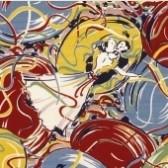 I have to confess that before I got this novel, kindly sent by Persephone Books, I knew next to nothing about D.E. Stevenson. Wikipedia tells me that she was the author of 'more than 40 light romantic novels' but does not go on to say that she sold a total of 4 million books in the UK and 3 million in the US. Despite this huge success, until recently she was one of those many talented mid-20th-century writers who had pretty much sunk without trace. I did know that Persephone had published two of them, Miss Buncle's Book and Miss Buncle Married, but though I had read plenty of rave reviews of these titles I'd never got around to reading them.
I have to confess that before I got this novel, kindly sent by Persephone Books, I knew next to nothing about D.E. Stevenson. Wikipedia tells me that she was the author of 'more than 40 light romantic novels' but does not go on to say that she sold a total of 4 million books in the UK and 3 million in the US. Despite this huge success, until recently she was one of those many talented mid-20th-century writers who had pretty much sunk without trace. I did know that Persephone had published two of them, Miss Buncle's Book and Miss Buncle Married, but though I had read plenty of rave reviews of these titles I'd never got around to reading them.
For anyone as ignorant as I was, these two books follow Barbara Buncle from her life in a small English village which she is forced to leave when she publishes a book featuring recognisable characters, to her marriage to a publisher, her move to Hampstead, and eventually to another small village, Wandlebury, where her husband hopes she won't start writing about the neighbours again. These two books were published in the mid 1930s, and in 1943 Stevenson returned to Barbara's life in Wandlebury. It is of course wartime, but Arthur Abbot is still living at home with Barbara and the children. Not so for his nephew Sam, who is fighting in the desert, a source of some anxiety for his wife Jerry, the second Mrs Abbot.
I'm always a sucker for books written or set in the war, and this one provides yet another perspective on what life was like at that time for the British middle classes. Barbara is certainly unrepresentative for having her husband at home, but Jerry has given over part of her house for the use of local soldiers, causing rather a lot of quite enjoyable chaos and inevitable crushes on Jerry herself. Barbara, meanwhile, has taken a family of evacuees into a cottage in her grounds, and is (rather disturbingly) appalled by their commonness and the dirt and disorder they create in the house. Barbara also takes in Jane, a young woman with a mysterious past, who turns out to be a famous romantic novelist on the run from her bullying sister, who wants her to keep on writing trashy novels while Jane herself wants to do something more worthwhile. A couple of romances spring up, one ultimately more successful than the other.
Of course, it would be easy to quibble about some of the elements here. The most obvious of these is the attitude to the lower classes -- not only the Boles family from London, whose accents and attitudes horrify Barbara, but also Pearl Besserton, with whom a young neighbor has fallen in love, but who is frankly too common to be accepted by his family. Even when young Elmie Boles returns to Barbara's house and asks for asylum from her horrid family, though she is cleaned up and taught to speak properly, her final destination is to be life as a housemaid. No mixing of classes here, then.
But to tell you the story like this hardly encompasses what is so delightful about this novel. There are some great characters here -- Markie, Jerry's old governess, now her housekeeper, who is a great intellectual and a classical scholar, young RAF officer Lancreste Marvell, who keeps confiding in an unwilling Barbara about his passionate attachment to the dreadful Pearl, and my particular favourites Barbara's small children Simon and Fay, both of them wonderfully conceived and delightfully real. And then of course there are the two Mrs Abbots -- Jerry, who misses her husband but soldiers on splendidly without him, and who flys at her remaining gardener when he says he isn't going to sign up:
Suddenly Jerry saw red. The others had all gone -- all the good ones -- Fred and Edgar...and Sam, too. Edgar was dead. Fred was starving in a German war prison. Sam was lost in the wilds of an African desert, and here was Rudge, sitting in the warm, comfortable harness room eating an enormous supper and laughing at them...
-- and of course there is Barbara herself, seemingly quite vague and whimsical, but with an almost complete inability to speak anything but the truth, however inconvenient that may be. I look forward very much to meeting her again, in an earlier incarnation.
So -- a light read, yes, but none the worse for that. Thanks, Persephone.
